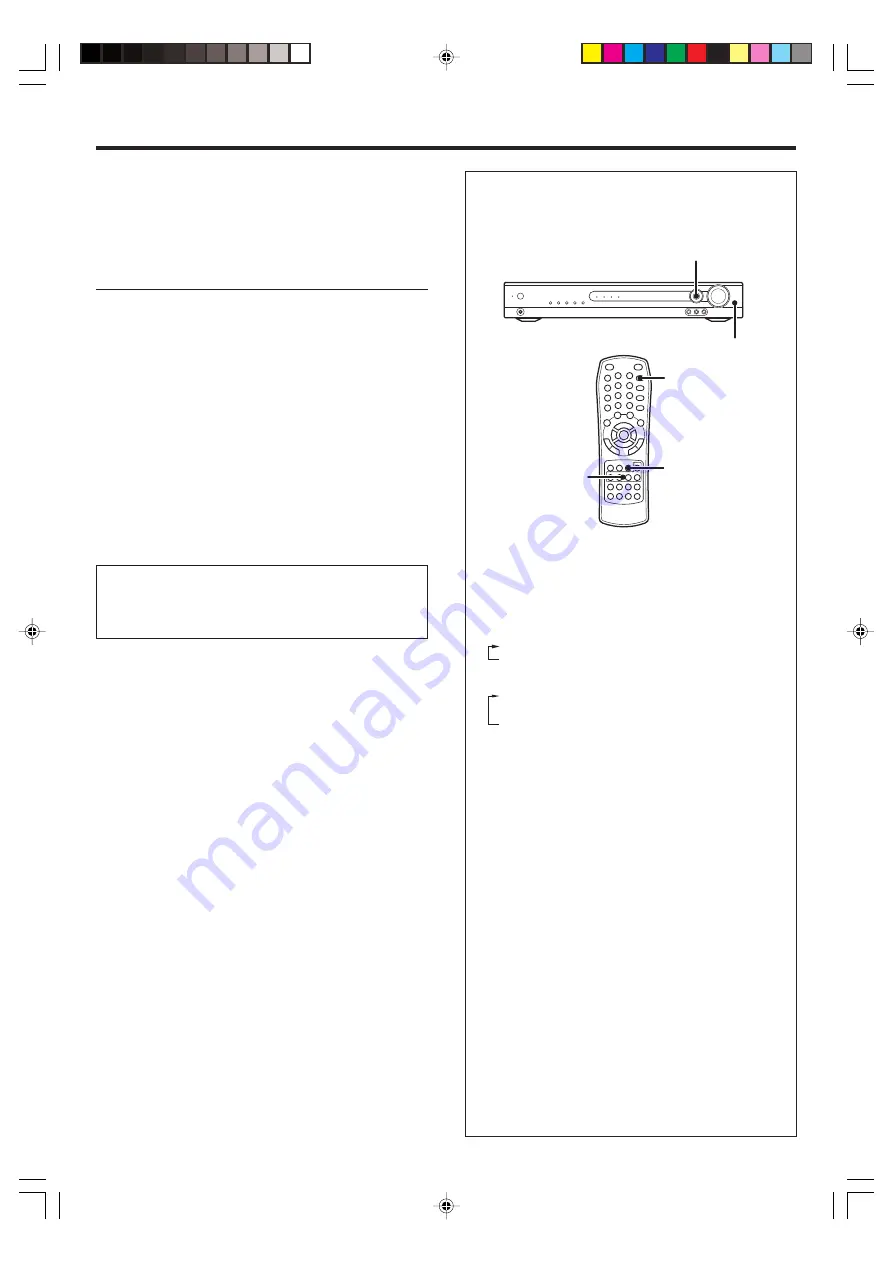
8
EN
Input mode settings
DVD, VIDEO1 and
VIDEO2
inputs each include jacks for digital audio
input and analog audio input.
After completing connections and turning on the receiver, follow the
steps below.
1
Use the INPUT SELECTOR knob or Input Selector keys to
select DVD, VIDEO1 or VIDEO2.
2
Press the INPUT MODE key.
Each press switches the setting as follows:
In DTS play mode
1
F-AUTO
(digital input, analog input)
2
D-MANUAL
(digital input)
In DVD, VIDEO1 or VIDEO2 play mode
1
F-AUTO
(digital input, analog input)
2
D-MANUAL
(digital input)
3
ANALOG
(analog input)
Digital input:
Select this setting to play digital signals from a DVD, CD, or LD
player.
Analog input:
Select this setting to play analog signals from a cassette deck, VCR,
or record player.
Auto detect:
In “
F-AUTO
” (full auto) mode, the receiver detects the digital or
analog input signals automatically. Priority is given to digital signal
during input mode selection. The receiver will select the input mode
and listening mode automatically during playback to match the type
of input signal (Dolby Digital, PCM, DTS ) and the speaker setting.
The initial factory setting is full auto.
To keep the receiver set to the currently selected listening mode,
use the
INPUT MODE
key to select “
D-MANUAL
” (digital manual).
However, even when this setting is selected, there may be cases
in which the listening mode is selected automatically to match a
Dolby Digital source signal depending on the combination of listening
mode and source digital.
In
D-MANUAL
mode, if the audio reproduction stops in the middle
due to change in the input signals etc, press the
LISTEN MODE
key.
If the
INPUT MODE
key is pressed quickly, sound may not be
produced. Press the
INPUT MODE
key again.
• Noise may be produced when using some functions such as
Search with a DTS compliant disc.
In this case, set the Input mode to “
D-MANUAL
”.
Setting up the system
Make connections as shown in the following pages.
When connecting the related system components, be
sure to refer to the instruction manuals supplied with
the components you are connecting.
Do not connect the power cord to a wall outlet until all
connections are completed.
Notes
1. Be sure to insert all connection cords securely. If their connections are
imperfect, the sound may not be produced or there will be noise
interference.
2. Be sure to remove the power cord from the AC outlet before plugging
or unplugging any connection cords. Plugging/unplugging connection
cords without disconnecting the power cord can cause malfunctions
and may damage the unit.
3. Do not connect power cords from components whose power
consumption is larger than what is indicated on the AC outlet at the
rear of this unit.
Analog connections
Audio connections are made using RCA pin cords. These cables transfer
stereo audio signal in an “analog” form. This means the audio signal
corresponds to the actual audio of two channels. These cables usually
have 2 plugs at each end, red for the right channel and white for the left
channel. These cables are usually packed together with the source unit,
or are available at your local electronics retailer.
Microcomputer malfunction
If operation is not possible or an erroneous display appears, even
though all connections have been made properly, reset the
microcomputer by referring to “In case of difficulty”.
º
INPUT SELECTOR
LISTEN MODE
Input
Selector
LISTEN MODE
INPUT MODE
名称未設定-7
04.3.25, 4:47 PM
8









































